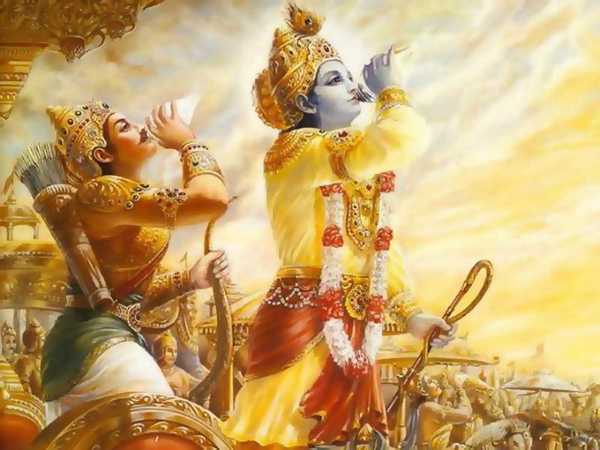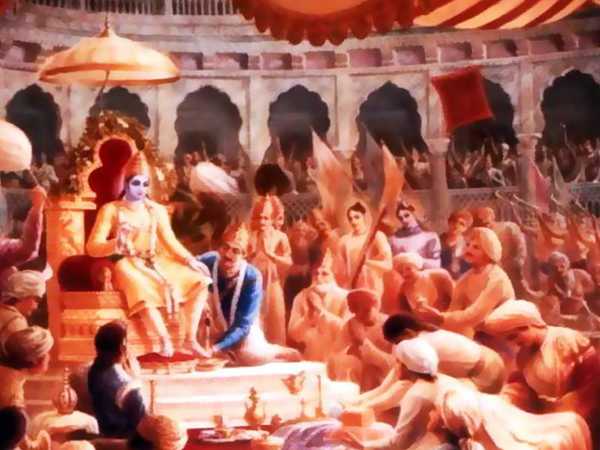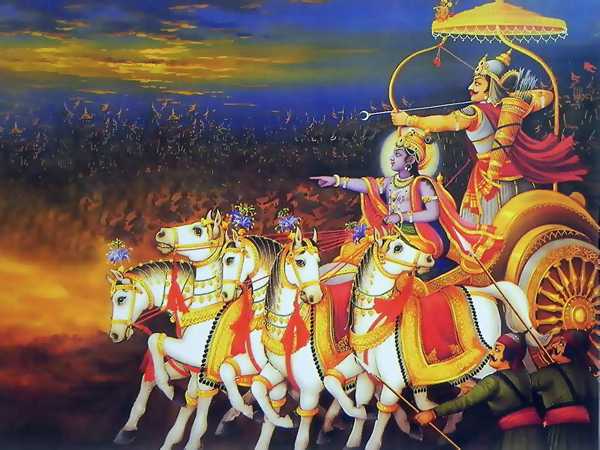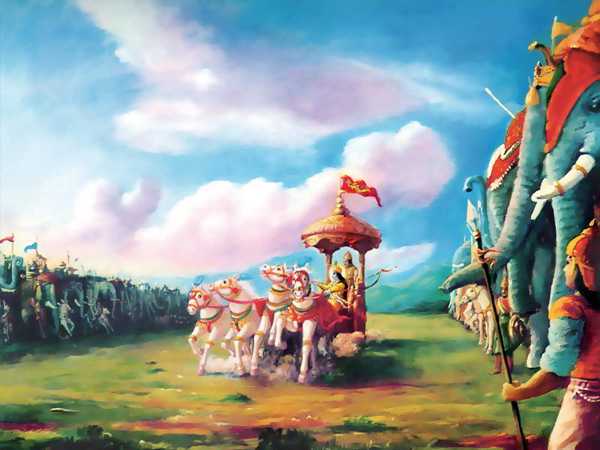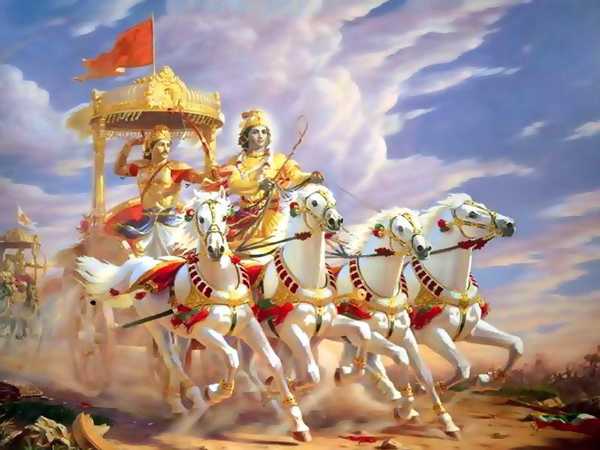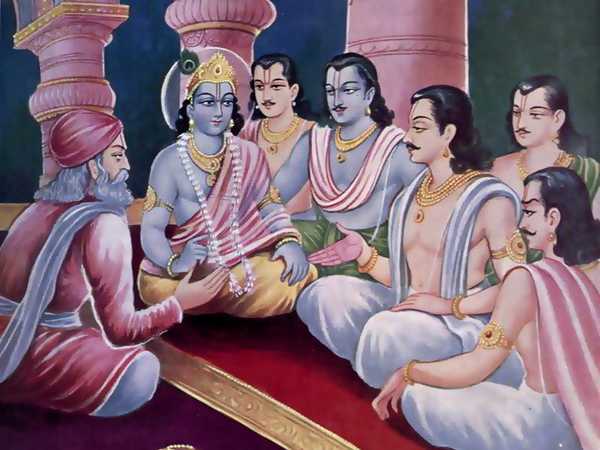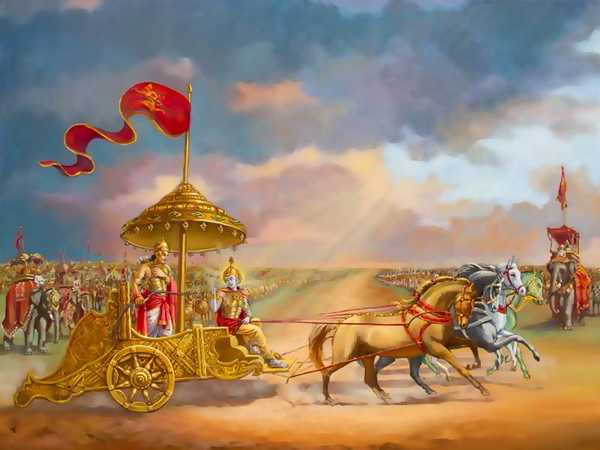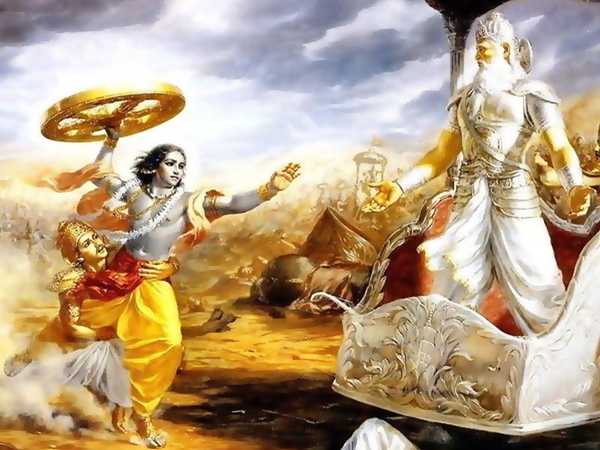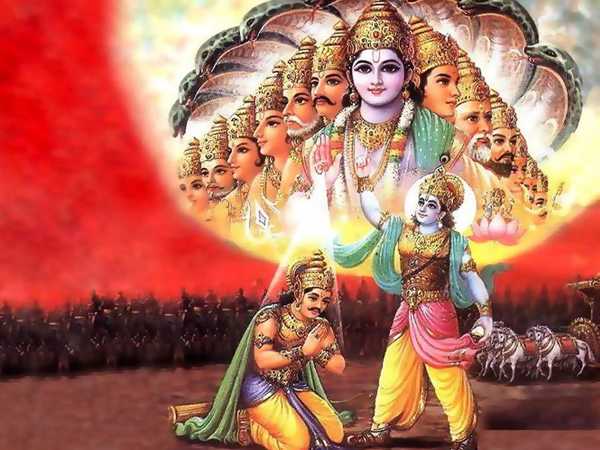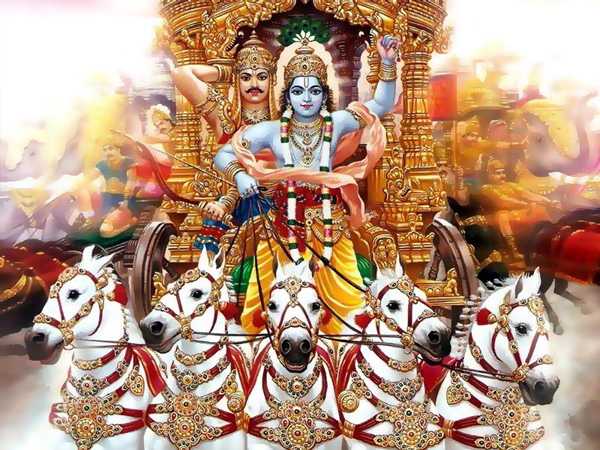Chapter 309
“‘Vasishtha said, Listen now to me as I discourse to thee on Buddhas(Supreme Soul) and Abuddha (Jiva) which is the dispensation of attributesof Sattwa, Rajas, and Tamas.
Chapter 309
Janamejaya said, “Having felt great affliction on account of theabduction of their wife and having rescued Krishna thereafter, what didthe Pandavas next do?”
Chapter 31
“Vyasa said, ‘Blessed be thou, O Gandhari, thou shalt behold thy sons andbrothers and friends and kinsmen along with thy sires this night like menrisen from sleep.
Chapter 31
“Sanjaya said, ‘After those three car-warriors had left that spot, thePandavas arrived at that lake within which Duryodhana was restinghimself.
Chapter 31
“Yudhishthira said, ‘O Sanjaya, the righteous and the unrighteous, theyoung and the old, the weak and the strong, are all under the control ofthe Creator, It is that Supreme Lord who imparteth knowledge to the childand childishness to the learned, according to his own will.
Chapter 31
“Yudhishthira said, ‘What men, O chief of Bharata’s race, are worthy ofreverent homage in the three worlds? Tell me this in detail verily. I amnever satiated with hearing thee discourse on these topics.’
Chapter 31
“The Holy One said, ‘Listen, O son of Pritha, how, without doubt, thoumayst know me fully, fixing thy mind on me, practising devotion, andtaking refuge in me.
Chapter 31
Vaisampayana said,–“I shall now recite to you the deeds and triumphs ofNakula, and how that exalted one conquered the direction that had oncebeen subjugated by Vasudeva.
Chapter 31
“Dhritarashtra said, ‘It seems that Arjuna slew all of you at his will.Indeed, the Destroyer himself could not escape him in battle, if Arjunatook up arms against Him.
Chapter 31
“Vaisampayana said, ‘O mighty king, entering into king Virata’s service,and dwelling in disguise in his excellent city, the high-souled Pandavasof immeasurable prowess, completed the promised period of non-discovery.
Chapter 31
“Saunaka said, ‘O son of Suta, what was Indra’s fault, what his act ofcarelessness? How was Garuda born in consequence of the ascetic penancesof the Valakhilyas? Why also Kasyapa–a Brahman–had the king of birdsfor a son? Why, too, was he invincible of all creatures and unslayable ofall?
Chapter 31
Vaisampayana said, “The royal son of Pandu then addressed Narada, saying,’O holy one, I desire to hear of the birth of the child whose excretawere gold.’ Thus addressed by king Yudhishthira the just, the sage Naradabegan to narrate to him all that had occurred in connection with thatchild of golden excreta.
Chapter 31
“Yudhishthira said, ‘Thy speech, O Yajnaseni, is delightful, smooth andfull of excellent phrases. We have listened to it (carefully). Thouspeakest, however, the language of atheism.
Chapter 31
“The Brahmana said, ‘There are three foes in the world. They are said tobe ninefold, agreeably to their qualities. Exultation, satisfaction, andjoy,–these three qualities appertain to Goodness.
Chapter 31
“Sanjaya said, ‘Having been first broken by Arjuna of immeasurableprowess, and owing also to the failure of Drona’s vow, in consequence ofYudhishthira having been well-protected, thy warriors were regarded asdefeated.
Chapter 310
Yudhishthira said, “There is no limit to calamities. Nor is it possibleto ascertain either their final or efficient cause. It is the Lord ofjustice alone who distributeth the fruits of both virtue and vice.
Chapter 310
“Bhishma said, ‘Once on a time a king of Janaka’s race, while ranging theuninhabited forests in pursuit of deer, saw a superior Brahmana or Rishiof Bhrigu’s race.
Chapter 311
Vaisampayana said, “Yudhishthira saw his brothers, each possessed of theglory of Indra himself, lying dead like the Regents of the world droppedfrom their spheres at the end of the Yuga.
Chapter 311
“Yudhishthira said, ‘It behoveth thee, O grandsire, to discourse to me onthat which is freed from duty and its reverse, which is freed from everydoubt, which transcends birth and death, as also virtue and sin, which isauspiciousness, which is eternal fearlessness, which is Eternal andIndestructible, and Immutable, which is always Pure, and which is everfree from the toil of exertion.’
Chapter 312
Vaisampayana continued,–“Then agreeable to the words of the Yaksha thePandavas rose up; and in a moment their hunger and thirst left them.
Chapter 312
“Yajnavalkya said, Listen to me, O foremost of men, as I tell thee whatthe duration of time is in respect to the Unmanifest (or the SupremePurusha).
Chapter 313
Vaisampayana continued,–“Commanded by the Lord of justice to thus spendin disguise the thirteenth year of non-discovery, the high-souled
Chapter 313
“Yajnavalkya said, I have, one after another, told thee the order of thecreation, with their total number, of the various principles, as also theextent of the duration of each.
Chapter 314
‘Yajnavalkya said, Brahmanas conversant with the topics of enquiry speakof the two feet as Adhyatma, the act of walking as Adhibhuta, and Vishnuas Adhidaivatam (of those two limbs).
Chapter 315
“‘Yajnavalkya said, These three, O foremost of men, (viz., Sattwa, Rajas,and Tamas), are the attributes of Prakriti.
Chapter 316
“‘Yajnavalkya said, That which is without attributes, O son, can never beexplained by ascribing attributes to it.
Chapter 317
“Yajnavalkya said, I have already spoken to thee of the science of theSankhyas.
Chapter 318
‘Yajnavalkya said, Listen now to me, with attention, O king, as to whatthe places are to which those who die have to go.
Chapter 319
“Yajnavalkya said, ‘Thou hast asked me, O monarch, of that Supreme Brahmawhich resides in the Unmanifest.
Chapter 32
“Vaisampayana said, ‘When night came, all those persons, having finishedtheir evening rites, approached Vyasa.
Chapter 32
“Vaisampayana said, ‘Dismissed with salutation by the Pandavas, Sanjayaset out for (Hastinapura) having executed all the commands of theillustrious Dhritarashtra.
Chapter 32
“Dhritarashtra said, ‘Thus admonished (by his foes), how, indeed, didthat scorcher of enemies, my heroic and royal son, who was wrathful bynature, then behave?
Chapter 32
“Yudhishthira said,–‘O grandsire, O thou of great wisdom, O thou thatart conversant with all branches of knowledge, I desire to hear theediscourse on topics connected with duty and Righteousness.
Chapter 32
“Arjuna said, ‘What is that Brahman, what is Adhyatma, what is action, Obest of male beings? What also has been said to be Adhibhuta, and what iscalled Adhidaiva?
Chapter 32
Vaisampayana said,–“in consequence of the protection afforded byYudhisthira the just, and of the truth which he ever cherished in hisbehaviour, as also of the check under which he kept all foes, thesubjects of that virtuous monarch were all engaged in their respectiveavocations.
Chapter 32
“Sanjaya said, ‘Thy son then, O monarch, humbly approaching that mightycar-warrior, viz., the ruler of the Madras, addressed him, fromaffection, in these words, “O thou of true vows, O thou of great goodfortune,
Chapter 32
“Vaisampayana said, ‘Marching out of the city, those heroic smiters theMatsyas, arrayed in order of battle, overtook the Trigartas when the sunhad passed the meridian.
Chapter 32
“Sauti said, ‘O foremost of Brahmanas, the gods having prepared forbattle in that way, Garuda, the king of birds, soon came upon those wiseones. And the gods beholding him of excessive strength began to quakewith fear, and strike one another with all their weapons.
Chapter 32
Vaisampayana said, “Unto king Yudhishthira who still remained speechlessand plunged in grief, the island-born Vyasa, that great ascetic,conversant with truths of religion, spoke again.”
Chapter 32
“The Brahmana said, ‘In this connection is cited the old narrative, Olady, of the discourse between a Brahmana and (king) Janaka.
Chapter 32
“Draupadi said, ‘I do not ever disregard or slander religion, O son ofPritha! Why should I disregard God, the lord of all creatures?
Chapter 32
“Sanjaya said, ‘Of fierce deeds in battle and above all fatigue, asproved by their feats, five sons of Pandu, with Krishna, are incapable ofbeing resisted by the very gods.
Chapter 320
“Yudhishthira said, ‘Having acquired great power and great wealth, andhaving obtained a long period of life, how may one succeed in avoidingdeath?
Chapter 321
“Yudhishthira said, ‘Without abandoning the domestic mode of life, Oroyal sage of Kuru’s race, who ever attained to Emancipation which is theannihilation of the Understanding (and the other faculties)?
Chapter 322
“Yudhishthira said, ‘How was Suka, the son of Vyasa, in days of old, wonover to Renunciation? I desire to hear thee recite the story. Mycuriosity in this respect is irrepressible.
Chapter 323
“Yudhishthira said, ‘If there is any efficacy in gifts, in sacrifices, inpenances well-performed, and in dutiful services rendered to preceptorsand other reverend seniors, do thou, O grandsire, speak of the same tome.
Chapter 324
“Yudhishthira said, ‘Tell me, O grandsire, how the high-souled Suka ofaustere penances took birth as the son of Vyasa, and how did he succeedin attaining to the highest success?
Chapter 325
“Bhishma said. ‘The son of Satyavati having obtained this high boon fromthe great God, was one day employed in rubbing his sticks for making afire.
Chapter 326
“Bhishma said, ‘Thinking of Emancipation, Suka approached his sire andpossessed as he was of humility and desirous of achieving his highestgood, he saluted his great preceptor and said,–Thou art well versed inthe religion of Emancipation.
Chapter 327
“Bhishma said, The next morning, king Janaka, O Bharata, accompanied byhis minister and the whole household, came to Suka, placing his priest inthe van.
Chapter 328
“Bhishma said, ‘Having heard these words of king Janaka, Suka of cleansedsoul and settled conclusions began to stay in his Soul by his Soul,having of course seen Self by Self.
Chapter 329
“Bhishma said, ‘Hearing these words of their preceptor, Vyasa’s disciplesendued with energy, became filled with joy and embraced one another.
Chapter 33
“Vaisampayana said. ‘Then those foremost of men divested of wrath andjealousy, and cleansed of every sin, met with one another, agreeably tothose high and auspicious ordinances that have been laid down byregenerate Rishis.
Chapter 33
“Vaisampayana said, ‘King Dhritarashtra endued with great wisdom (then)said to the orderly-in-waiting, ‘I desire to see Vidura. Bring him herewithout delay.’
Chapter 33
“Sanjaya said, ‘Whilst Duryodhana, O king, was repeatedly roaring in thisstrain, Vasudeva, filled with wrath, said these words unto Yudhishthira,”What rash words hast thou spoken,
Chapter 33
“Yudhishthira said, ‘Which act, O grandsire, is the foremost of all thosethat have been laid down for a king? What is that act by doing which aking succeeds in enjoying both this world and the next?’
Chapter 33
“The Holy One said, ‘Now I will tell thee that art without envy that mostmysterious knowledge along with experience, knowing which thou wilt befreed from evil.
Chapter 33
Vaisampayana said,–“the ever-victorious Nakula, the son of Pandu, havingreached Hastinapura, formally invited Bhishma and Dhritarashtra. Theelder of the Kuru race with the preceptor at their head, invited with dueceremonies, came with joyous hearts to that sacrifice, with Brahmanaswalking before them.
Chapter 33
“‘Duryodhana said, “Listen, once more, O ruler of the Madras, to what Iwill say unto thee, about what happened, O lord, in the battle betweenthe gods and the Asuras in days of yore.
Chapter 33
“Vaisampayana said, ‘Then, O Bharata, when the world was enveloped indust and the gloom of night, the warriors of both sides, without breakingthe order of battle, desisted for a while.
Chapter 33
“Santi said, ‘And that bird, assuming a golden body bright as the rays ofthe Sun, entered with great force (the region where the Soma was), like atorrent entering the ocean. And he saw, placed near the Soma, a wheel ofsteel keen-edged, and sharp as the razor, revolving incessantly.
Chapter 33
“Yudhishthira said, ‘Sons and grandsons and brothers and sires andfathers-in-law and preceptors and maternal uncles and grandsires, manyhigh-souled Kshatriyas, many relatives (by marriage), friends,companions, sister’s sons, and kinsmen, O grandsire, and many foremost ofmen coming from diverse countries, have fallen.
Chapter 33
“The Brahmana said, ‘I do not, O timid one, move in this world in thatmanner which thou, according to thy own understanding, censurest.
Chapter 33
‘Vaisampayana said, “Hearing these words of Yajnaseni, Bhimasena, sighingin wrath, approached the king and addressed him, saying, ‘Walk, Omonarch, in the customary path trodden by good men, (before thee) inrespect of kingdoms.
Chapter 33
“Sanjaya said, ‘The Parthas then, headed by Bhimasena, approached thatinvincible array protected by Bharadwaja’s son. And Satyaki, andChekitana, and Dhrishtadyumna.
Chapter 330
“Bhishma said, ‘After Vyasa had left the spot, Narada, traversing throughthe sky, came to Suka employed in studying the scriptures.
Chapter 331
“‘Narada said, By listening to such scriptures as are blessed, as bringabout tranquillity, as dispel grief, and as are productive of happiness,one attains to (a pure) understanding, and having attained to it obtainsto high ‘felicity.
Chapter 332
“‘Narada said, When the vicissitudes of happiness and sorrow appear ordisappear, the transitions are incapable of being prevented by eitherwisdom or policy or exertion.
Chapter 333
“Bhishma said, Having ascended the summit of the mountain, O Bharata, theson of Vyasa sat down upon a level spot free from blades of grass andretired from the haunts of other creatures.
Chapter 334
“Bhishma said, ‘Having spoken in this way (unto all things), theregenerate Rishi of austere penances, viz., Suka, stayed on his successcasting off the four kinds of faults.
Chapter 335
“Yudhishthira said, ‘If a man be a house-holder or a Brahmacharin, aforest-recluse or a mendicant, and if he desires to achieve success, whatdeity should he adore?
Chapter 336
“Bhishma said, ‘Addressed by Narayana, that foremost of beings, in thesewords, Narada, the foremost of men, then said these words unto Narayanafor the good of the world.
Chapter 337
“Bhishma said, ‘Then upon the expiration of the great Kalpa, when thecelestial Purohita Vrihaspati was born in the race of Angiras, all thedeities became very happy.
Chapter 338
“Yudhishthira said, ‘When the great king Vasu was so wholly devoted toNarayana, for what reason then did he fall down from heaven and why againhad he to sink beneath the surface of the Earth?”
Chapter 339
“Bhishma said, ‘Arrived at the spacious realm called White Island, theillustrious Rishi beheld those same white men possessed of lunarsplendour (of whom I have already spoken to thee). Worshipped by them,the Rishi worshipped them in return by bending his head and reverencingthem in his mind.
Chapter 34
“Sauti said, ‘Hearing this story of the re-appearance and departure ofhis forefathers, king Janamejaya of great intelligence became highlypleased.
Chapter 34
“Dhritarashtra said, ‘Tell me what may be done by a person that issleepless and burning with anxieties, for thou alone amongst us, O child,art versed in both religion and profit.
Chapter 34
“The Holy One said, ‘Once more still, O mighty-armed one, listen to mysupernal words which, from desire of (thy) good, I say unto thee thatwouldst be pleased (therewith).
Chapter 34
“Sanjaya said, ‘When that fierce battle, O monarch, was about tocommence, and when all the high-souled
Chapter 34
“Bhishma said, ‘One should always offer the most reverent worship untothe Brahmanas. They have Soma for their king, and they it is who conferhappiness and misery upon others.
Chapter 34
Vaisampayana said,–“then, O king, Yudhishthira, having approached andworshipped his grandfather and his preceptor, addressed Bhishma and Dronaand Kripa and the son of Drona and Duryyodhana and Vivingsati, andsaid,–‘Help me ye all in the mater of this sacrifice. This largetreasure that is here is yours. Consult ye with one another and guide meas ye desire.
Chapter 34
“‘Duryodhana said, “After the fears of those throngs of the pitris, thegods, and the Rishis had thus been dispelled by that high-souled Deity,Brahman then offered his adorations, unto Sankara, and said these wordsfor the benefit of the universe,
Chapter 34
“Vaisampayana said, ‘Thus addressed by Yudhishthira Susarman wasoverwhelmed with shame and hung down his head. And liberated (fromslavery), he went to king Virata, and having saluted the monarch, tookhis departure.
Chapter 34
‘Sauti continued, ‘Garuda then said, ‘O Purandara, let there befriendship between thee and me as thou desirest.
Chapter 34
“Yudhishthira said, ‘After doing what acts does a man become liable toperform expiation? And what are those acts which he must do for beingfreed from sin? Tell me this, O grandsire.’
Chapter 34
“The Brahmana’s wife said, ‘This is incapable of being understood by aperson of little intelligence as also by one whose soul has not beencleansed.
Chapter 34
Vaisampayana said, “Thus addressed by Bhimasena, the high-souled kingAjatasatru firmly devoted to truth, mustering his patience, after a fewmoments said these words, ‘No doubt, O Bharata, all this is true. Icannot reproach thee for thy torturing me thus by piercing me with thyarrowy words.
Chapter 34
“Sanjaya said, ‘Hearing these words of the intelligent Yudhishthira, theson of Subhadra, O Bharata, urged his charioteer towards Drona’s array.
Chapter 340
“Bhishma said, ‘Thus hymned with names that were not known to others, theDivine Narayana having the universe for his form showed himself to theascetic Narada.
Chapter 341
Saunaka said, How is that illustrious god, viz., the puissant Narayanawho is fully conversant with the Vedas and their branches, at once thedoer and the enjoyer of sacrifices?
Chapter 342
Janamejaya said, “O holy one, it behoveth thee to tell me thesignificance of those diverse names uttering which the great Rishi Vyasawith his disciples hymned the praises of the illustrious slayer of Madhu.
Chapter 343
“Arjuna said, ‘How did Agni and Shoma, in days of yore, attain touniformity in respect of their original nature? This doubt has arisen inmy mind. Do thou dispel it, O slayer of Madhu!’
Chapter 344
Saunaka said, “O Sauti, excellent is this narrative which thou hastrecited. Verily, these ascetics, having heard it have all been filledwith wonder.
Chapter 345
“Nara and Narayana said, ‘Deserving art thou of the highest praise, andhighly favoured hast thou been, since thou hast beheld the puissantNarayana himself (in the form of Aniruddha).
Chapter 346
Vaisampayana said, “On one occasion, while residing in the retreat ofNara and Narayana, Narada the son of Pramesthi, having duly accomplishedthe rites and observances in honour of the deities, set himself toperform thereafter the rites in honour of the Pitris.
Chapter 347
Vaisampayana said, ‘Having heard these words of Nara and Narayana, theRishi Narada became filled with devotion towards the Supreme Being.
Chapter 348
Janamejaya said, ‘I have heard from thee the glory of the divine andSupreme Soul. I have heard also of the birth of the Supreme Deity in thehouse of Dharma, in the form of Nara and Narayana.
Chapter 349
Janamejaya said, “The illustrious Hari becomes gracious unto them thatare devoted to him with their whole souls. He accepts also all worshipthat is offered to Him agreeably to the ordinance.
Chapter 35
“Dhritarashtra said, ‘O thou of great intelligence, tell me again wordssuch as these, consistent with religion and profit. My thirst for hearingthem is not quenched. What thou sayst is charming!”
Chapter 35
“Arjuna said,–‘This discourse about the supreme mystery, calledAdhyatman, which thou hast uttered for my welfare, hath dispelled mydelusion.



